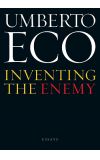
30 Aug 2013 01:52:46
This is, of course, not the case; what it shows, rather, is that Eco – as anyone who has read The Name of the Rose would know – is at home in the middle ages. Then again, he is at home in all ages: in the first essay in this collection translated by Richard Dixon, which also gives it its title, he cites, in the course of two pages Priscus of Pnion (5th century AD), Rodolphus Glaber (10th), Liutprand of Cremona (10th), Edgar Bérillon (20th), Felix Fabri (15th), Giuseppe Giusti (19th) and Ian Fleming (20th). I am familiar with the work of only one of these, but the impression that list gives – of a real show-off – is false: at no point does one feel intimidated by this parade of authors, who might be obscure to those of us who do not hold professorships in comparative literature. In fact, he picks examples from these works to show the long continuity of thought that describes enemies as stinky. (The example he gives from Fleming is his description of Rosa Klebb's smell: "cheap scent concealing animal odours".)
There is something sensual about his invocation of all sorts of authorities; were I speaking informally I'd say this kind of thing gives me the horn (in an intellectual sense). I'd keep those kind of words to myself were it not for the fact that Eco himself, in one of the essays here, coins the term "librido", meaning "that form of libido" which seeks to penetrate (my own, loaded, word) and understand (Eco's unloaded one) the past and present through reading. I mean, come on: if the very name Pseudo-Dionysius the Areopagite (5th-6th centuries AD) doesn't give you some kind of a pleasant feeling, then this book is not for you. (The "pseudo" is to avoid confusion with one or other Dionysiuses, not to imply fakery.)
That would be a pity, for there is plenty here for everyone, and some of it is up-to-the-minute. The subtitle may be a semi-provocative exaggeration, but this collection of occasional pieces does cover a lot of ground. In some cases almost literally, as when Eco describes Abel Tasman's search for the Solomon Islands in 1643, where he sees Tasmania, New Zealand, Tonga, Fiji and New Guinea, making a vast loop around Australia – without ever seeing Australia ("no mean achievement", writes Eco, and a handy map proves his point).
But we also have essays composed entirely of insults directed at Joyce's Ulysses by critics from the Italian fascist press of the time, the new kind of censorship in which a lot of noise is made to drown out the more relevant sounds ("with apologies to Wittgenstein ... 'Whereof one cannot speak, thereof one must talk a great deal'"). Most relevantly – considering that as I write these words, Chelsea Manning is beginning the second day of her 35 years in prison, and this paper is, for all I know, still sweeping up bits of crushed hard drive from its basement – we have "Thoughts on WikiLeaks". Here, Eco makes the very important point that "the rule that secret files must contain only information already known is essential for the operation of a secret service, and not just in this century". (In passing, he gives us the key to the success of Dan Brown: "Followers of the occult believe in only what they already know, and in those things that confirm what they have already learned.")
Sometimes – or should that be always? – in order to understand the present, it helps to have a very good command of what has happened in the past, even in its darker corners.

